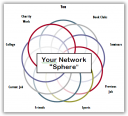As I’ve been talking about all week, just writing a book and throwing it up on a website is not marketing a book. One of the keys to success for your book is not only writing, but networking. Like anything else, networking does take work, but it’s a lot easier for me because I visualize it.
 One of the networking ideas that I’ve been playing around with is something called a “Sphere of Influence.” It probably looks familiar or even mundane, but it’s a visual aid that helps me take a look at how different aspects of my life might overlap with one another, to identify different contacts I have. Maybe a friend from college is someone I used to work with; it could be that the person I met at a seminar also performs charity work for the same organization.
One of the networking ideas that I’ve been playing around with is something called a “Sphere of Influence.” It probably looks familiar or even mundane, but it’s a visual aid that helps me take a look at how different aspects of my life might overlap with one another, to identify different contacts I have. Maybe a friend from college is someone I used to work with; it could be that the person I met at a seminar also performs charity work for the same organization.
By looking at what your “spheres of influence” currently have, like the image I created at left, networking can suddenly appear a little less daunting. Click on the thumbnail to see the full size.
Reconnect with People in Your Network
I recommend reconnect with the people you already know in your network, to nurture your current contact list. (Friendly emails are a great place to start.) Do you owe anyone favors? Have to return a book you borrowed? Promised someone a guest blog post? (Oops, sorry Alana Joli, I’ll get right on that…) Or are you on the receiving end of that favor; does someone owe you an autograph or recommendation?
Whether you schedule time for coffee or send an e-card, nurturing people within your existing network is akin to watering your garden to get plants to grow. As cheesy as it may sound, if you don’t recognize each and every person you’ve “friended” on LiveJournal, MySpace or Facebook, then you probably have some work cut out for you.
Expand your Network, One Person at a Time
While you’re nurturing the people within your network, you can slowly expand your pool of contacts to include new people and (eventually) new spheres. The key thing, though, is that you have to reach out to people in a friendly, mutually beneficial way. For example, if I were to network with Stephen King, I’d probably try to figure out if there something I could do for him. Maybe I would recommend him for an interview with horror webzine Flames Rising, or maybe I would find out where he was next speaking at and alert the local newspapers (if they didn’t know already).
I’ve found that by just being me (all moody, ranty, and random parts of me), people are a lot more receptive than if I were to generate a writer’s public persona that so many authors are wont to do. You have to do what’s best for you, mind you, but it’s really easy to misstep when confronted with a rather, large ego. I can honestly say that that’s something I’ve had to work on, partially because I believe in the idea of a writer’s community where we support one another. Ego has no place in that world, for me.
So before you get frustrated that you’re not on the New York Times bestseller’s list, or that you’re not making enough freelancing or on your beautiful book, keep in mind that getting there is not just a matter of talent, it also depends a lot on “who you know.” Fortunately, networking is something we can all manage.
Feel free to network with me; I’m including my LinkedIn page even though it’s not 100% complete. (Working with HR on job descriptions). I may not always be accessible, but I do my darnedest to try. If you have something specific you’re looking for, feel free to ping me or use my contact page. If I don’t know the answer to your question, I might know someone who does.
Darkshiver: Monica’s LiveJournal
Monica’s FaceBook Profile
Monica’s LinkedIn Profile
Happy socializing, and thanks for reading!

